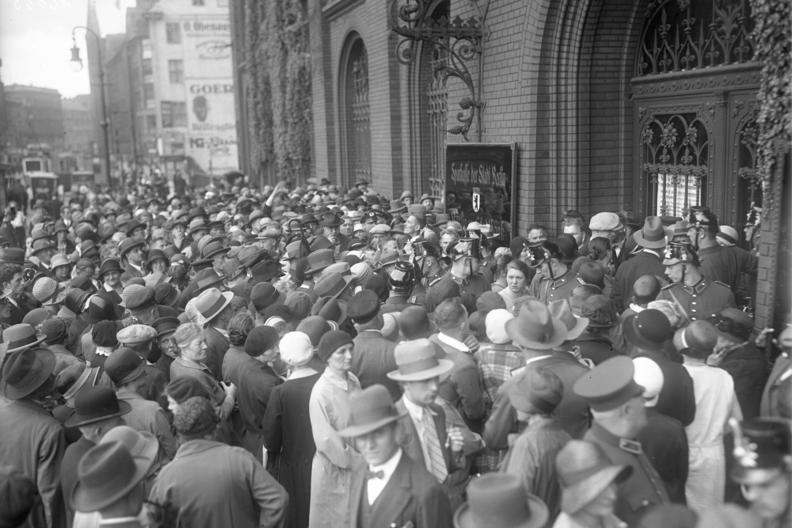Black Friday – But Not The One You Think Posted by Sten on Nov 25, 2016 in Culture, Holidays, Language
Black Friday is known in the United States as a day of ridiculous discounts and jaw-dropping, long lines at stores. This day was exported to other countries as well, including European countries. Mostly online stores offer great discounts here as well. Black Friday is called “black” for the great profits (the “black numbers) companies make on that day. But Schwarzer Freitag was not always a day of excessive consumption – quite the opposite…
25. Oktober – Der Schwarze Freitag

This is not a Black Friday sale, but a bank run at the städtischen Sparkasse (municipal Sparkasse bank) in Berlin on July 13, 1931. (Image by Georg Pahl at Commons.wikimedia.org under license CC BY SA 3.0 de)
Thursday, October 24, 1929 was the beginning of the Weltwirtschaftskrise (“global economic crisis”, the Great Depression). The Börse (stock exchange) in New York crashed and kept crashing on the days following. It became Weltnachrichten (global news) on October 29, known as Black Tuesday. Alright, many black days here, but where is the Friday?
Germany is in a timezone that is ahead of the United States, and 6 hours ahead of New York. That Thursday, October 24, when the market crashed, it was already Friday in Germany, because it was after midnight. So this Black Thursday, which heralded the start of the biggest financial crisis of the 20th century, is known in Germany as Schwarzer Freitag. The Börsensturz (stock market crash) also had a big Einfluss (impact) on Germany’s Wirtschaft (economy). Only in 1936, Germany reached Vollbeschäftigung (full employment) again, though with low Löhne (wages) and bad Arbeitsbedingungen (labor conditions).
Black Friday in Deutschland
The other Black Friday, the one we all now know so well, of course also exists in Germany. There are many deals, and even websites dedicated to giving you information on where to get the best deals. So if you wanna go shopping in Germany today, here some useful vocabulary!
| Unglaublich | unbelievable |
| der Wahnsinn (m) | insanity, madness |
| das Wahnsinnsangebot (n) | incredible offer |
| die Angebote (n) | offers, deals |
| das Schnäppchen (n) | bargain, deal |
| der Artikel (m) | product, item |
| der Rabatt (m) | discount |
| die Prozente (n) | percentages |
| bis zu 90% Rabatt! | up to 90% off! |
| reduzieren | to reduce, to cut |
| knallhart | uncompromising, brutal |
| der Ausverkauf (m) | sale |
| sparen | to save |
| (sich) ein Schnäppchen sichern | to secure a deal |
| der Einkaufswagen (m) | shopping cart |
| bezahlen | to pay |
| die Kreditkarte (f) | credit card |
| die EC-Karte (f) | debit card |
| etw. in bar bezahlen | to pay sth. in cash |
| warten | to wait |
| in der Schlange stehen | to wait in line, to queue |
| endlich! | finally! |

Build vocabulary, practice pronunciation, and more with Transparent Language Online. Available anytime, anywhere, on any device.
About the Author: Sten
Hi! I am Sten, both Dutch and German. For many years, I've written for the German and the Dutch blogs with a passion for everything related to language and culture. It's fascinating to reflect on my own culture, and in the process allow our readers to learn more about it! Besides blogging, I am a German-Dutch-English translator, animator and filmmaker.




Comments:
John Loth:
Good useful list of financial vocabulary. Thanks.
Brightstar:
I’ve seen something like this ‘ab 20€’ indicating prices. Would that be ‘no more than 20€’
Also, how can I ask if they have seniors discount? For instance in museums
Dankeschön
Sten:
@Brightstar Hi Brightstar,
“ab 20€” means “from 20€”. “No more than 20€” would be “nicht mehr als 20€”.
Seniors discount would be Seniorenrabatt. Or “Rabatt für Senioren”. Often, it will say something like “65+”, “Rentner” (retired people), or “ermäßigt” (reduced) for people that can have a reduced ticket price such as students and elderly people.